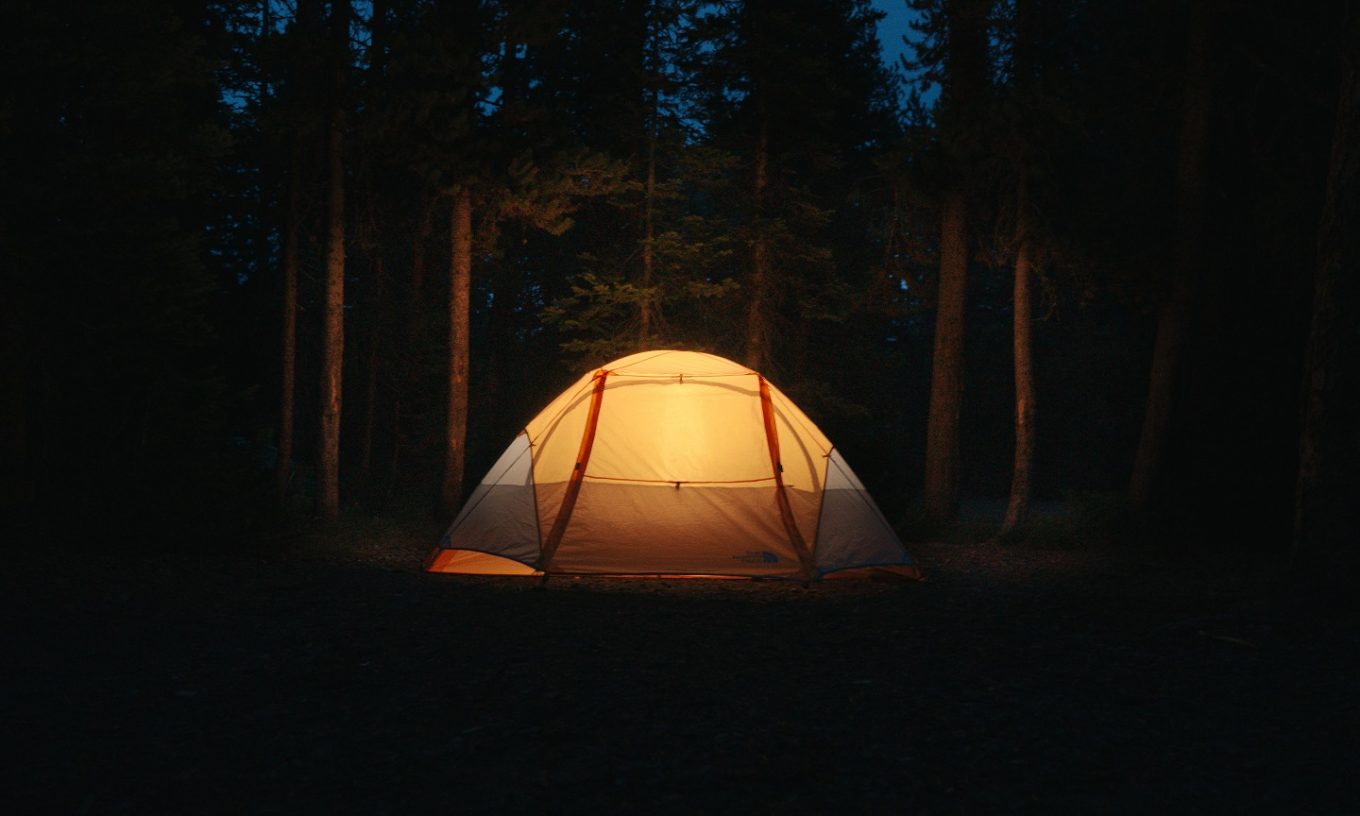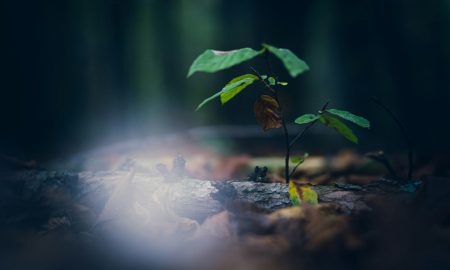I blinked, but in the dark, it made no difference. Like fools we had pitched our tent-for-two in a small clearing under a chestnut tree during the day, despite gray clouds misting over the mountain tops. Now it was the blackest night. The storm had struck, the moon was invisible, and there was the looming fear of dislodged branches falling on us from the chestnut tree. I could see nothing but I could tell that the storm was, perhaps, not too angry. There was a weak flash of lightning, and for a moment, the tarpaulin tent’s roof was revealed: thick drops of rain sat wide on the translucent dome-sheet. Darkness. Then a strong flash, and the tent’s interior was lit as if in a snapshot from an old camera. I saw our cylindrical rucksacks standing guard by the tent’s entrance, the zip of my sleeping bag running in a curve from my chest down to my sheathed feet, our plastic battery-lamp hanging from the tent’s hook— all came in a white moment, then returned to black again. I could not sleep and I could not see. I did not want to wake Nusrat, who was sleeping next to me. I lay in the dark, a light sleeper listening to a world rendered mostly in sound.
The thunder arrived but without melodrama — it was a soft explosion, a biblical boom far above the clouds but far below the intensity of the strong white flash. Leaves of the chestnut tree were guarding us, probably, from direct impact of the rain since the water sounded as if it was dripping in rhythm, not falling by chance: a tup-pit-tup-pit-tup-pit pattern. But occasionally there was a splattering sound — like water flicked on the windshield of a moving car — accompanied with a gust which shook our well-pegged tent with a whomp, the sound of wet clothes being wrung and hung on a clothesline. I took a deep breath; at least the air felt cool with a pluvial scent. To my left, Nusrat was reduced to a light snore — the kind where she inhales with a grunt and breathes out with the horse-like sound of drumming lips. I turned onto my chest, and even I seemed only the synthetic sighs of cloth rubbing against a nylon sleeping bag. Turning again, irritated, I clicked my tongue. How could she sleep with this much sound about?
Eventually the light shower subsided but still some sounds remained. The gusts had turned into sustained breezes whistling against the tent. And the window-flap, sealed shut, had a loose outer layer with hanging straps; together these made the fluttering sound of a flag. The dripping continued but with a reduced frequency. A quieter phase, yet the trepidation of falling branches, of not knowing. The snap of a twig. What was that? Another breeze: whistling tent, fluttering flap, and now, just next to my ear but on the other side of the tent, a series of sniffs, seemingly. I strained my ears, alert in the dark. Was it just the flap’s sound? I could not tell if I was imagining these effects, and, bizarrely, I felt it would be a relief to hear some distinctive animal sounds — sharp exhalation from a moist muzzle or the flapping wet ears of a well shaken head — just to have a confirmed referent in the dark for the sounds I thought I was hearing.
Time itself seemed lost to black and I just could not sleep. Was there an animal or not? Why did the sleeping bag feel tighter? Was the darkness even receding? I ruffled out of the bag with a grumble. I had to go out and investigate. The tent’s door was completely open and I was not surprised to see that the sky was a cloudless, uninterrupted blue; even less surprised to see a huge lake just some distance ahead, which we had not seen the day before. Its water was emerald, and small waves, little licks of glimmering water, were washing over a white beach — I am not sure if they made any sound. Returning to the tent, I poked my head into the flap and saw myself still asleep on the ground. With an emerging daze at the back of my head, I looked up from the bag to see that there was nobody at the tent’s entrance. It was zipped shut.
Morning sunlight emanated from the tent’s walls, and the interior was a light pink now. I groaned as my movement caused a squelching noise: rainwater had seeped in, I told Nusrat and, sitting up, she looked at me unknowingly, her hair disheveled. Without a word, she wriggled away from the seepage to sleep again. Finally, I rose up in truth, unzipped the entrance, which made a sharp buzzing sound, and walked out into the morning.
The sky was a clear and cloudless blue but its want for white was now fulfilled by Himalayan peaks dressed in snow all the way down to where they were obstructed by nearer, smaller mountains. These were green with pine trees seemingly sticking out at odd angles. The rain had cleaned everything such that each color, green, white, or blue, had more volume and luster. Looking down at the damp clearing, my brown trekking shoes too looked vivid against the blades of grass which were all clear, all coated in dew and distinct from each other. Serrated leaves from the chestnut tree dappled the ground and the tent too, some stuck face down, others face up. The thick drops still clung to the pink tarpaulin.
There was, everywhere, a universal silence. Not a whisper of wind shook the chestnut leaves or a pine needle, and I longed for the dispatch of a drop to sound itself. It was the wild, ancient silence of tree bark or a stone. Deep mystery emanated from the landscape, and I felt that secrets were being kept from me.
Photo by Dex Ezekiel on Unsplash





